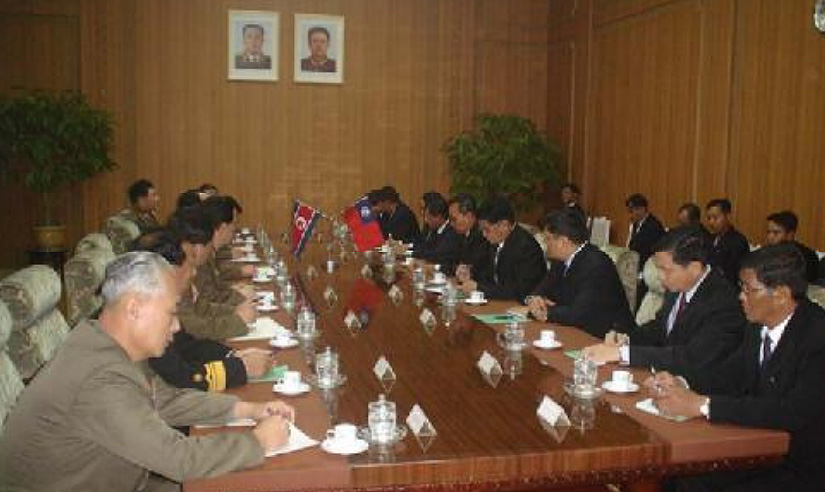The Peninsula
As Burma Evolves, Questions About Its Future With Korea
Published January 31, 2012
Category: North Korea

By Ben Hancock
It’s still unclear whether the rapid political shift underway in Burma can carry its momentum. Even the matter of what is truly driving its evolution seems to be guesswork at this point; and as the NYT’s Edward Wong reminds us, there is the minor matter of a seething rebellion in the Kachin region for the government of President Thein Sein to overcome — hopefully in a way that ends without dramatic displacement or violence. But either way, if what the world is witnessing now signals a lasting change in a country long seen as Southeast Asia’s answer to North Korea, it raises a fresh set of questions about what an open, U.S.-oriented Burma could mean for the Korean Peninsula.
For U.S. policy makers, past and present military engagement between Pyongyang and Naypyidaw appears to be the area of chief concern. Senate Foreign Relations Committee Ranking Member Richard Lugar (R-Ind.) said in November that his panel was told years ago about the North helping Burma to develop nuclear weapons. Speaking just before Secretary of State Hillary Clinton’s trip to Burma (which included a stop-off in Busan), Lugar put that information out there to “throw a spotlight on this issue and make sure it’s on the table in our talks with the Burmese government,” an aide told The Washington Post. The information had already surfaced in cables released in 2010 by Wikileaks, although doubts were raised then, too, about the degree to which a Burmese nuclear program could have advanced.
It seems fair to assume that if Mr. Sein continues along his current trajectory, Burma’s military cooperation with the North — however limited or expansive it really is — will grind to a halt. With a U.S. ambassador on the way and prospects for eased sanctions on the horizon, the promise of economic development in Burma is almost sure to outweigh any perceived benefits of maintaining military links the North. In a recent editorial, Sydney Morning Herald writer William Pesek asks an interesting question: Could that mean the North follows Burma’s lead.
There are clear differences between the states. Pesek writes that Burma was never as “surreal” as North Korea has become; the surprising durability and pervasiveness of the authoritarian regime in the North is unique. David Steinberg, professor of Asian studies at Georgetown, writes in the Irrawady that the propaganda machine employed by the Burmese junta was never as effective at cocooning its people in misinformation as Pyongyang’s is. But Pesek also makes another interesting point: Burma could be just the latest in a string of lost customers to North Korea. The Arab Spring revolutions — which took out Gaddafi and rattled Syria — have whittled at its list of weapons buyers.
A Burma that embraces the U.S. may also mean a Burma that leans away from China. News media have documented how the neighbors are already on thin ice over the Myitsone hydroelectric dam. That project is being pursued by a Chinese state-owned enterprise, but was suspended last year by Burmese leaders in a surprising response to public opposition. It’s possible that this clears the way for increased investment from close U.S. ally South Korea — a resource-poor country that already has its hand in the Burmese market. Seoul and Naypyidaw announced in 2010 that they were upping their cooperation in the energy sector by exploiting two more gas blocks.
Perhaps more importantly, Burma’s political shift could lessen the moral hazard that Korean companies face in investing in the Southeast Asian country. Korean Gas Corp (KOGAS) and Daewoo International hold sizable stakes in the Shwe gas pipeline project, which has been deeply controversial. EarthRights International filed an official complaint against the companies via the Organization for Economic Cooperation and Development (OECD), charging that they had ignored human rights abuses entailed in the construction of the pipeline. That kind of behavior doesn’t seem to be particularly new; complaints filed in the U.S. against the now-defunct Unocal oil company in 1997 involved many similar claims.
But one would hope that a regime that is now releasing political prisoners would also lay the groundwork for a more responsible business environment. The next test of the new regime’s commitment to democracy will come on April 1, when the country holds a by-election for parliamentary seats.
Ben Hancock is a reporter covering international trade and investment. He has studied Korean language and culture since 2004, and lived in Korea most recently from 2008 to 2010. His views are his own.
Picture from DPRK – Myanmar Military Delegation Visit, 2008.
